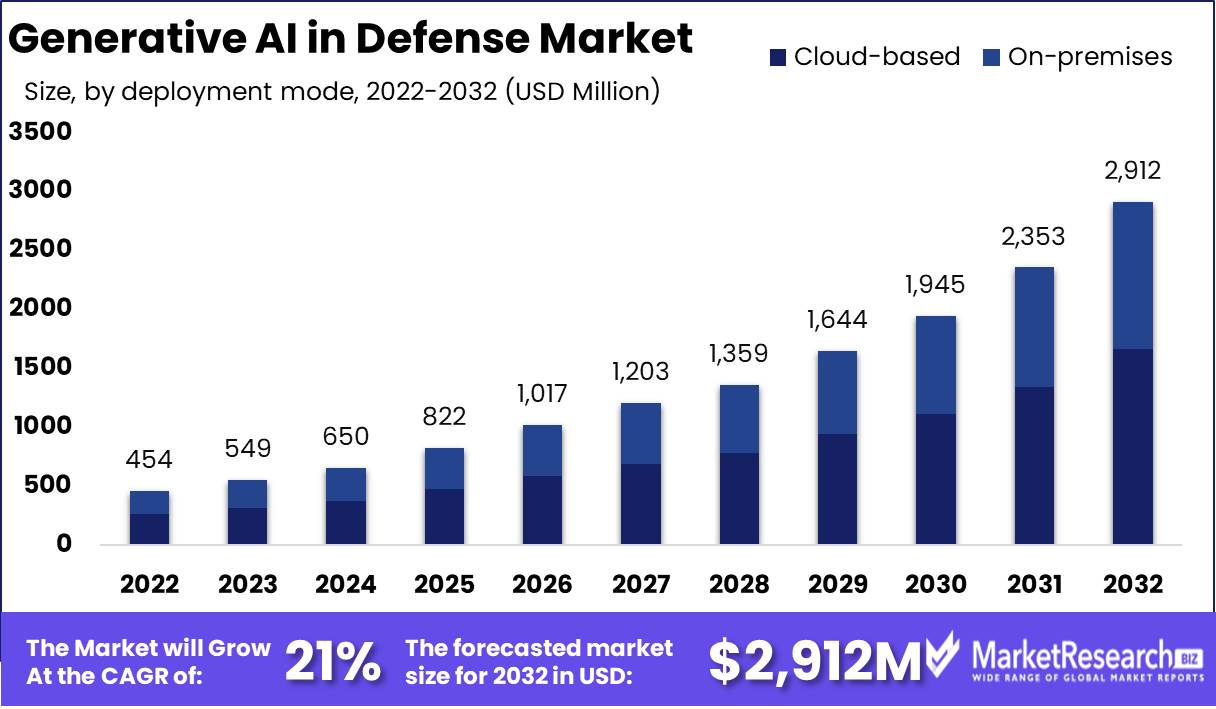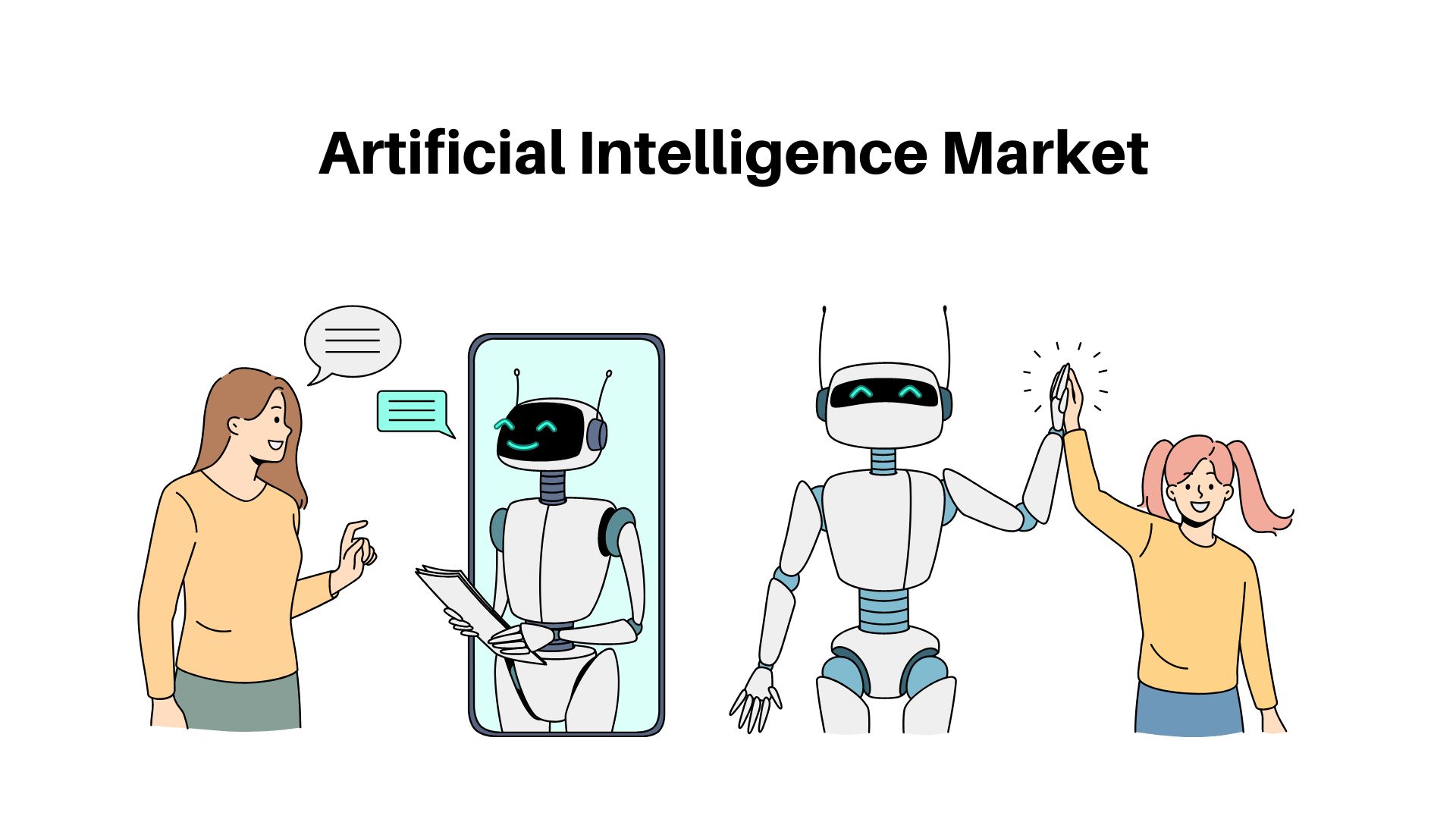Generative AI in Defense Market to Reach USD 2912 Mn with 21% CAGR In 2032

Page Contents
Market Overview
Published Via 11Press : Generative AI in Defense Market size is expected to be worth around USD 2912 Mn by 2032 from USD 454 Mn in 2022, growing at a CAGR of 21% during the forecast period from 2022 to 2032.
Generative artificial intelligence (AI) in defense market has gained significant traction and adoption over recent years. Generative AI refers to using machine learning algorithms to produce unique content resembling real-world data, such as images, texts or even entire scenarios that resemble it. Generative AI technology holds immense promise for improving various aspects of military operations ranging from intelligence gathering and mission planning to training simulations and cybersecurity.
Generative AI's most prominent application in defense is intelligence gathering. By processing large volumes of data sourced from multiple sources such as satellite imagery, sensor networks and social media feeds, generative AI algorithms can produce realistic simulations and predictive models which enable military analysts to assess potential threats, identify patterns and evaluate different courses of action more quickly and more informedly. By automating this process generative AI allows faster decision-making through faster intelligence analysis processes.
Generative AI plays an essential role in mission planning and simulation. Military planners utilizing generative algorithms can use virtual scenarios created with these algorithms to simulate real-world environments such as terrain, weather conditions and enemy behavior – providing military strategists the chance to test out and refine strategies, evaluate equipment performance and train personnel in immersive virtual environments – ultimately improving operational readiness while mitigating risks associated with training exercises or actual missions.
Another key application of generative AI in defense is cybersecurity. Adversarial attacks like malware, phishing and network intrusions pose substantial threats to military systems and infrastructure, making cybersecurity even more vital. Generative AI algorithms can assist in creating robust defense mechanisms by simulating potential attack scenarios and identifying vulnerabilities; additionally by continuously simulating attacks generative AI can support proactive and adaptive cybersecurity measures, increasing resilience and protection of networks and systems within military networks and systems.
Generative AI brings many advantages to the defense sector, yet there are ethical and security considerations that must be addressed as well. Potential misuse for malicious purposes such as producing deepfake videos or misinformation raises legitimate concerns regarding the authenticity and trustworthiness of digital content produced using GenAI systems containing sensitive military data. Furthermore, effective safeguards and regulations must be put in place in order to prevent unauthorized access and manipulation of these systems containing sensitive military data.
Request Sample Copy of Generative AI in Defense Market Report at: https://marketresearch.biz/report/generative-ai-in-defense-market/request-sample

Key Takeaways
- Generative AI holds tremendous promise for improving intelligence gathering, mission planning, training simulations and cybersecurity in the defense sector.
- Automating data analysis enables faster and more informed decision-making by streamlining large volumes of disparate information.
- Generative AI facilitates the creation of realistic virtual scenarios to test military strategies and assess equipment performance.
- Generative AI assists in the design of preventative and adaptive cybersecurity measures by simulating potential attack scenarios.
- Ethical considerations and robust security measures are critical in order to address potential misuse and protect sensitive military information.
- Efficient AI applications can unlock new levels of efficiency, effectiveness and preparedness in defense operations.
- Generative AI reduces risks associated with training exercises and actual missions by offering immersive virtual environments that mirror reality.
- Through continuous development of AI algorithms, the defense sector can remain competitive in an ever-evolving security environment.
Regional Snapshot
North America and, especially the United States, have seen generative AI as an area of focus for defense research and development. The U.S. Department of Defense has made substantial investments in AI technologies, including generative AI solutions, to increase intelligence capabilities and optimize military operations. Major defense contractors and research institutions in North America are developing advanced generative AI solutions such as autonomous systems, predictive modeling and cybersecurity applications that utilize this type of artificial intelligence technology.
Europe has also made significant strides in adopting generative AI for military use, with countries such as Britain, France and Germany pioneering this use. Research institutions and defense companies alike collaborate on innovative generative AI solutions for intelligence analysis, decision support systems and virtual training simulations.
Asia-Pacific countries like China and South Korea have invested significantly in generative AI for defense purposes, with China leading the charge in terms of AI technologies and progress made on developing military applications such as surveillance systems, unmanned vehicles and information warfare systems using such applications. South Korea too has invested heavily in such applications to increase intelligence-gathering capabilities as well as improve decision-making abilities.
The Middle East's security environment has inspired keen interest in using generative AI for defense applications, with countries such as Israel investing heavily in such technologies to increase their defense capabilities and boost intelligence analysis, cybersecurity protection and military simulation capabilities. Such technologies help increase situational awareness and prepareness.
For any inquiries, Speak to our expert at: https://marketresearch.biz/report/generative-ai-in-defense-market/#inquiry
Drivers
Technological Innovations
AI technologies, particularly generative AI, are playing an increasingly significant role in the defense market. Advancements in computing power, data availability and algorithm development have created opportunities to use generative AI in various defense applications – enhancing data analysis capabilities, simulation capabilities and decision support systems, ultimately improving overall effectiveness of defense operations.
Increased Complexity of Threats
As security threats increase in complexity and scope, traditional defense strategies and systems often can no longer keep up. Generative AI offers the potential to generate realistic simulations, detect patterns in vast amounts of data, and develop proactive defense mechanisms against evolving threats effectively.
Operational Efficiency and Cost Reduction Strategies
Defense organizations are always searching for ways to increase operational efficiency and cut costs, and Generative AI can play a critical role in meeting this objective. By automating processes, optimizing resource allocation and speeding decision-making; such as automating intelligence analysis of large datasets; Generative AI algorithms can facilitate faster decision-making allowing defense organizations to allocate their resources more efficiently while making timely informed decisions with data intelligence.
International Competition and Geopolitical Considerations
Maintaining a competitive advantage in international defense landscape is another factor driving adoption of generative AI. As countries strive to strengthen their defense capabilities, generative AI offers a pathway for them to gain an advantage in areas such as intelligence gathering, autonomous systems, cybersecurity and geopolitical considerations such as regional security dynamics and power projection. Furthermore, integration of generative AI into defense strategies ensures national security and influence.
Restraints
Ethical Issues and Abuse of Data Center Resources
One of the primary barriers to using generative AI for defense purposes is ethical concerns related to its potential misuse. Generative AI could potentially be used for producing deepfake content, spreading misinformation or conducting cyber-attacks; to prevent malicious use it must ensure the authenticity and trustworthiness of digital content produced using this method.
Data Access and Quality Solutions
Generative AI models rely on having access to high-quality training data, but in the defense sector gaining such access may prove challenging due to security restrictions, limited labeled datasets and protecting sensitive military information. Achieve sufficient and diverse training data is therefore key for creating successful AI algorithms.
Explainability and Interoperability
Generative AI models often lack transparency and interpretability, making it challenging to comprehend their underlying reasoning and decision-making process. Explainability becomes even more essential in critical defense scenarios for creating trust between humans and AI-generated outputs; otherwise their acceptance or adoption in defense applications could be limited or denied altogether.
Security and Vulnerabilities Analysis
Generative AI introduces unique security challenges. Adversaries could exploit weaknesses in these systems to manipulate generated content or attack their algorithms, making ensuring security and integrity an enormous task that requires rigorous security measures and ongoing monitoring to mitigate potential risks.
Opportunities
Intelligence Analysis and Decision Support
Generative AI offers tremendous potential to augment intelligence analysis and decision support in the defense sector. By processing large volumes of data, generative AI algorithms can generate insights, identify patterns, and make recommendations in real-time to military analysts and decision-makers for informed and effective decision-making that leads to improved operational results.
Simulation and Training
Generative AI offers the defense industry realistic and immersive simulations and training. Virtual environments created with these algorithms accurately mimic real-life situations, enabling military personnel to practice and hone their skills safely at minimal costs – leading to improved readiness and improved performance during actual operations.
Cybersecurity and Threat Detection Solutions
As cyber threats continue to escalate, opportunities arise for generative AI defense applications. Generative AI algorithms can simulate potential attack scenarios, identify vulnerabilities within networks and systems, and develop proactive cybersecurity measures. With these capabilities at their disposal, defense organizations are better able to strengthen their defenses, detect threats in real time, and respond efficiently when responding to cyber incidents.
Autonomous Systems and Robots
Integrating generative AI into autonomous systems and robotics presents exciting possibilities for the defense market. Generative AI algorithms can be leveraged to improve unmanned vehicles, drones, and robotic systems with autonomous decision making, adaptive behavior patterns, advanced mission planning capabilities and increased efficiency while decreasing risks to personnel while expanding operational capacities.
Take a look at the PDF sample of this report: https://marketresearch.biz/report/generative-ai-in-defense-market/request-sample
Challenges
Regulated Industries and Policy Frameworks
Rapid development and adoption of generative AI within defense present unique regulatory frameworks and policies with which to grapple. Establishing guidelines that outline its responsible and ethical use as well as compliance with international laws and standards poses unique challenges; creating comprehensive frameworks which address this unique aspect is even harder.
Limit of Human-AI Collaborations
Integration of generative AI into defense operations relies on effective collaboration between humans and AI systems, but challenges in terms of trust, understanding AI outputs and effectively capitalizing on its insights exist. Bridging the gap between human operators and generative AI algorithms remains an enormously daunting challenge.
Scalability and Adaptability
Scaling up generative AI solutions to meet the diverse needs of defense organizations can be a formidable task. Adopting appropriate algorithms in response to various operational requirements, data sources, and emerging threats is of utmost importance; creating adaptable generative AI systems capable of meeting those evolving demands poses an immense technical challenge.
Bias and Fairness
Generative AI algorithms can be susceptible to biases present in training data, which can amplify and perpetuate existing prejudices or biases. Ensuring fairness and mitigating bias in generative AI outputs – particularly sensitive defense applications – is a challenge that needs to be met, including any related to gender, ethnicity or other factors which might compromise the accuracy or reliability of AI-generated content.
Market Segmentation
Based on components
- Software
- Services
Based On Deployment Mode
- Cloud-based
- On-Premises
Based on Application
- Target recognition
- Decision Support Systems
- Autonomous Systems
- Cybersecurity
- Other Applications
Based on End-Users
- Government/Military
- Defense Contractors
- Research Institutions
Key Players
- IBM Corporation
- Lockheed Martin Corporation
- BAE System plc.
- Northrop Grumman Corporation
- Raytheon Technologies Corporation
- General Dynamics Corporation
- Thales Group
- Leidos Holdings, Inc.
- Other Key Players
Report Scope
| Report Attribute | Details |
| Market size value in 2022 | USD 454 Mn |
| Revenue Forecast by 2032 | USD 2912 Mn |
| Growth Rate | CAGR Of 21% |
| Regions Covered | North America, Europe, Asia Pacific, Latin America, and Middle East & Africa, and Rest of the World |
| Historical Years | 2017-2022 |
| Base Year | 2022 |
| Estimated Year | 2023 |
| Short-Term Projection Year | 2028 |
| Long-Term Projected Year | 2032 |
Request Customization Of The Report: https://marketresearch.biz/report/generative-ai-in-defense-market/#request-for-customization
Recent Developments
- In 2022, As an industry-leading defense contractor, Lockheed Martin has invested heavily in generative AI for defense purposes. They announced collaborations and partnerships with AI companies in 2022 to develop advanced generative AI systems suitable for autonomous systems, decision support applications and training simulation simulations.
- In 2021, BAE Systems is a global defense, security, and aerospace company that has been exploring artificial intelligence technologies. In 2021 they introduced “Mayhem,” an artificial intelligence system using generative AI to simulate potential cyberattacks to help organizations identify vulnerabilities and strengthen cybersecurity defenses.
- In 2021, Raytheon Technologies is a major aerospace and defense company that has been using generative AI for defense purposes. In 2021, they announced advancements in using this form of artificial intelligence for mission planning simulations as well as training simulations.
- In 2021, Palantir Technologies is an AI company known for its groundbreaking contributions in defense generative AI research and application. In 2021, they introduced models capable of analyzing and synthesizing synthetic data without risking security breaches for defense organizations looking to train AI systems on sensitive or limited information sources.
FAQ
1. What is Generative AI used for in defense applications?
A. Generative AI refers to the application of machine learning algorithms to create original content such as images, text or scenarios that resemble real-world data. When applied in defense it helps with intelligence gathering, mission planning, training simulations and cybersecurity.
2. How can Generative AI contribute to defense operations?
A. Generative AI enhances defense operations by automating intelligence analysis, optimizing resource allocation, improving decision-making through insights from large datasets, providing realistic training simulations and strengthening cybersecurity measures.
3. Are there any ethical considerations associated with Generative AI for defense purposes?
A. Yes, there are ethical concerns. Generative AI could be misused to generate fake news or spread misinformation, raising issues of authenticity and trustworthiness of digital content and necessitating measures against its malicious use, as well as addressing any ethical considerations that arise.
4. What are the challenges associated with using generative AI for defense applications?
A. Challenges associated with AI applications range from limited data availability and quality, the inability of AI models to be explained or understood, security vulnerabilities, regulatory frameworks and policy requirements as well as human-AI collaboration limitations; scaling issues; adaptability; as well as bias issues that limit fairness.
5. How can generative AI aid intelligence gathering and defense?
A. Generative AI facilitates intelligence gathering by processing large volumes of disparate data sources, such as satellite images and sensor networks, to generate simulations, predictive models, and insights that speed analysis and decision-making processes for defense intelligence analysts.
6. Can Generative AI Be Used for Defense Training Simulations?
A. Yes, generative AI is widely utilized to create realistic and immersive training simulations that enable military personnel to train in virtual environments that mimic real-world scenarios for enhanced preparedness and operational performance.
7. How can generative AI improve cybersecurity defenses?
A. Generative AI helps enhance cybersecurity by simulating potential attack scenarios, identifying vulnerabilities, and developing proactive defense mechanisms. Generative AI also aids in detecting threats to sensitive military information while responding quickly and efficiently to cyber incidents in real-time.
Contact us
Contact Person: Mr. Lawrence John
Marketresearch.Biz
Tel: +1 (347) 796-4335
Send Email: [email protected]
Content has been published via 11press. for more details please contact at [email protected]
The team behind market.us, marketresearch.biz, market.biz and more. Our purpose is to keep our customers ahead of the game with regard to the markets. They may fluctuate up or down, but we will help you to stay ahead of the curve in these market fluctuations. Our consistent growth and ability to deliver in-depth analyses and market insight has engaged genuine market players. They have faith in us to offer the data and information they require to make balanced and decisive marketing decisions.



